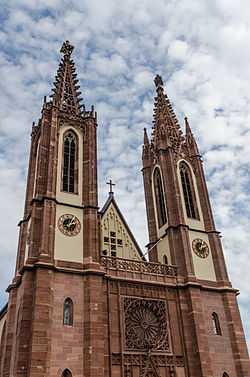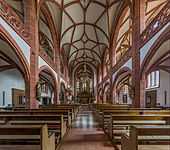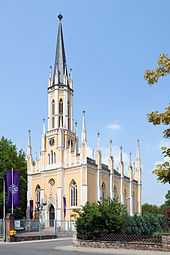Rheingauer Kantorei
| Rheingauer Kantorei | |
|---|---|
 Front of the Rheingauer Dom, a regular venue of the choir, 2013. The rose window is the logo of the choir. | |
| Origin | |
| Founding | 1977 |
| Genre | Mixed choir |
| Chief Conductor |
|
| Neue Rheingauer Kantorei | |
|---|---|
| Origin | Geisenheim |
| Founding | 2002 |
| Genre | Mixed choir |
| Chief Conductor | Tassilo Schlenther |
Rheingauer Kantorei (Rheingau chorale), now Neue Rheingauer Kantorei, is a mixed choir of the Rheingau region in Germany, performing mostly sacred music in services and concerts.

Frank Stähle
The choir was founded in 1977 by Frank Stähle as the choir of the Evangelisches Dekanat Wiesbaden-Rheingau (Protestant deanery Wiesbaden-Rheingau), merging two groups, the church choir of the Protestant parish in Geisenheim and singers from Wiesbaden. The purpose of the choir was to sing in church services of the region and to sing oratorios in concert. Main venues for the concerts were the Marktkirche in Wiesbaden and the Rheingauer Dom in Geisenheim. The groups rehearsed separately in Geisenheim and performed the concerts together.[1]
In 1978, the choir performed Handel's Messias, in the Rheingauer Dom and the Lutherkirche in Wiesbaden, and Ein deutsches Requiem by Johannes Brahms, in Geisenheim and the Marktkirche.[1]
In 1979, Bach's St Matthew Passion was performed in St. Bonifatius, Wiesbaden and in Worms, in a collaboration with the Wormser Kurrende. Mendelssohn's Elias was performed with the Radiosinfonieorchester Frankfurt, in Geisenheim and the Marktkirche.[1] Erich Wenk sang the title part, Klesie Kelly the soprano parts.[1]
In 1980, the Geisenheim group performed Buxtehude's Membra Jesu Nostri in Geisenheim.[1] The complete group sang Honegger's König David in the Marktkirche, with the Radiosinfonieorchester Frankfurt, and soloists Klesie Kelly, Claudia Eder as both young David and the Witch of Endor, and Gerd Nienstedt as the narrator.[2]
A concert on 13 June 1981 combined Palestrina's Missa Papae Marcelli, performed by selected voices under assistant conductor Horst Werner, and Bruckner's Mass No. 2 in E minor for eight-part choir and brass.[1] On 21 November 1981, the choir performed in the Marktkirche Bach's Mass in B minor as part of the Vierte Wiesbadener Bachwochen (Fourth Wiesbaden Bach Weeks), organized by Martin Lutz.[3]
Horst Werner
Stähle, who was director of Dr. Hoch's Konservatorium from 1979, passed the choir to Horst Werner, who had studied at the Musikhochschule Frankfurt with Helmuth Rilling.[4] He first conducted Haydn's Harmoniemesse and Bach's cantata Wachet! betet! betet! wachet! BWV 70, with Christoph Prégardien as a soloist.[1] In 1983, excerpts from the Psalmen Davids by Schütz were combined with Mozart's Vesperae de Dominica. In a second concert, the group sang Schubert's Mass No. 6 in e-flat major.[1]
In 1985, the choir performed Karol Szymanowski's Stabat Mater and Leoš Janáček' Glagolitic Mass with organist Elisabeth Maranca and the Südwestfälische Philharmonie (de).[1]
In 1986, the choir used the balconies of the Marktkirche to perform several settings of the Magnificat, including some polychoral compositions,[1] followed by a concert of Mozart's Requiem with the Folkwang Kammerorchester (de).[1] Helmut Hampel reported for the Wiesbadener Kurier that the Dies irae was shattering and Confutatis of eerie density.[5]
In 1987, the choir performed the second of the four versions of Bach's St John Passion, as the opening of four Passion compositions by four Wiesbaden-based choirs, including Bach's St Matthew Passion with the Schiersteiner Kantorei. Hampel noted in a review that Werner, also a musicologist, supplied solid historic background for the second version in the program notes and a preceding lecture, and that he managed to fill the turba chorusses with energy, in diction and even more in dramatic expression.[6] A second concert presented the Mass in A major by César Franck, and in a third concert Bruckner's Mass No. 3 in F minor, again with the Folkwang Kammerorchester.[1]
Neue Rheingauer Kantorei

A new choir, building on the tradition, was founded by Tassilo Schlenther in 2002, again expanding the choir of the Geisenheim parish. Venues for concerts have been the Rheingauer Dom, the Basilika of Schloss Johannisberg, the Basilika of Mittelheim, the Protestant church in Geisenheim and the Johanneskirche (de) in Erbach.[7][8][9]
The group, not yet under the name, collaborated with the choirs of St. Martin, Idstein, performing in 1996 Rutter's Magnificat,[10] in 1999 Puccini's Messa di Gloria[11] and in 2001 Rutter's Requiem and Britten's The Company of Heaven for speakers, soloists, chorus and orchestra,[12] all performed both in Idstein and Johannisberg. In 2009, the Neue Rheingauer Kantorei performed Haydn's Die Schöpfung with soloists Elisabeth Scholl, Daniel Sans and Andreas Pruys.[7] Services included an Easter vigil in Eberbach Abbey in 2013.[13] The choir participated in a television portrait of the ARD about the Rheingau region by Günter Wewel .[14] A concert in 2014, performed in the Geisenheim Protestant church, was dedicated to contemporary Scandinvian music including works by Ola Gjeilo and Knut Nystedt.[9]
References
- ↑ 1.0 1.1 1.2 1.3 1.4 1.5 1.6 1.7 1.8 1.9 1.10 1.11 Archiv Rheingauer Kantorei. Rheingauer Kantorei. 1985.
- ↑ Arthur Honegger: König David. Marktkirche, Wiesbaden. 1980.
- ↑ Johann Sebastian Bach: Hohe Messe in h-moll. Vierte Wiesbadener Bachwochen. 21 November 1981.
- ↑ "Horst Werner / Theorie". Dr. Hoch's Konservatorium. 1996. Retrieved 20 July 2014.
- ↑ Hampel, Helmut (25 November 1986). "Musikalisches Totengedenken in gelichteten Nebelschleiern". Wiebadener Kurier (in German).
- ↑ Hampel, Helmut (24 March 1987). "Altbekanntes in einer weniger geläufigen Version". Wiebadener Kurier (in German).
- ↑ 7.0 7.1 "Rheingauer Kantorei für ihre "Schöpfung" begeistert gefeiert" (in German). Rheingau-Echo. 20 May 2009. Retrieved 4 November 2010.
- ↑ "Brillante Musik in der Passionszeit / Konzert der "Neuen Rheingauer Kantorei" war ein musikalisches Erlebnis" (in German). Retrieved 27 July 2014.
- ↑ 9.0 9.1 "Wie im Himmel / Neue Rheingauer Kantorei präsentierte moderne Chormusik aus Skandinavien" (in German). Rheingau-Echo. 13 February 2009. Retrieved 27 July 2014.
- ↑ John Rutter: Magnificat. St. Martin. 1996.
- ↑ Messa di Gloria Giacomo Puccini. St. Martin. 8 May 1999.
- ↑ John Rutter Requiem / Benjamin Britten The Company of Heaven. 20 October 2001.
- ↑ "Bleibet hier, wachet und betet" "Kloster Eberbach bietet zu Ostern einmaliges religiöses Erlebnis" (in German). kirchen-wiesbaden.de. Retrieved 14 July 2014.
- ↑ "Kein schöner Land" (in German). ARD. Retrieved 27 July 2014.
External links
- Frank Stähle Dr. Hoch's Konservatorium (German)
- Horst Werner corodelcastello.de (German)
- Neue Rheingauer Kantorei Official website (German)